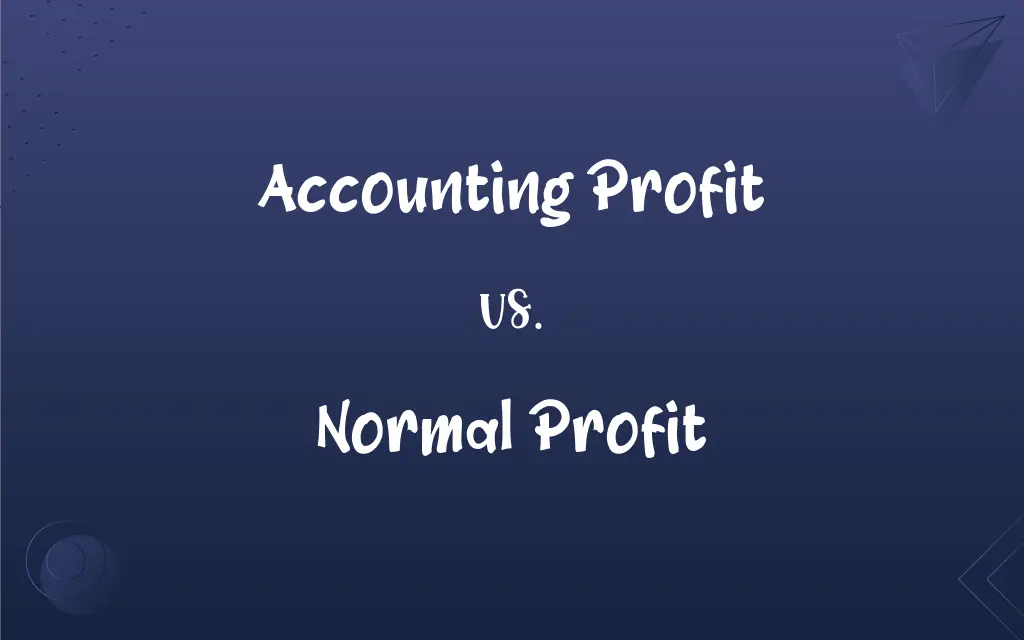Accounting Profit vs. Normal Profit: What's the Difference?
Edited by Aimie Carlson || By Janet White || Published on March 3, 2024
Accounting profit is total revenue minus explicit costs, while normal profit is the minimum earnings to keep a firm in business, equal to implicit costs.

Key Differences
Accounting profit, a common financial metric, is the difference between total revenues and explicit costs, including costs like salaries, materials, and rent. Normal profit, on the other hand, is a theoretical benchmark, representing the minimum level of profit needed to keep a business operational, essentially equating to the implicit costs, like opportunity costs of capital or owner's time.
In accounting profit, explicit costs are tangible and recorded in financial statements, making it a critical figure for tax calculations and financial reporting. Normal profit differs as it includes implicit costs, which are not directly recorded but are vital for understanding the true economic performance of a business, representing the opportunity costs of resources used in the business.
Accounting profit is a measurable and reportable figure, often used to assess a company's profitability and financial health, while normal profit is more conceptual, used in economic analysis to determine if a business is doing better than just covering its implicit costs.
The calculation of accounting profit is straightforward, involving basic arithmetic of revenues minus explicit costs. In contrast, normal profit calculation requires a deeper understanding of economics, involving both explicit and implicit costs, the latter often being subjective and challenging to quantify.
Accounting profit can be seen in financial statements and is often the basis for investor and stakeholder decisions. In contrast, normal profit, while not as visible in financial statements, is crucial for long-term business strategy, indicating whether a business is merely surviving or truly thriving.
ADVERTISEMENT
Comparison Chart
Definition
Total revenue minus explicit costs
Minimum earnings to stay in business, equal to implicit costs
Nature
Tangible and quantifiable
Theoretical and includes opportunity costs
Usage
Used for tax, reporting, and financial analysis
Used for economic analysis and business decision-making
Calculation
Based on recorded financial transactions
Includes both explicit and estimated implicit costs
Visibility
Visible in financial statements
Not directly visible, more conceptual
ADVERTISEMENT
Accounting Profit and Normal Profit Definitions
Accounting Profit
Financial gain calculated by subtracting explicit costs from total earnings.
The accounting profit gave shareholders confidence, reflecting the company's strong operational efficiency.
Normal Profit
The break-even earnings level where total revenues equal implicit and explicit costs.
Despite making a normal profit, the business owner considered diversifying to increase earnings.
Accounting Profit
The surplus remaining after deducting business expenses from gross income.
Despite the market downturn, the firm's accounting profit remained positive, showcasing resilience.
Normal Profit
The baseline profit needed to keep an entrepreneur in business instead of pursuing alternatives.
The restaurant was only making a normal profit, leading the owner to consider other business opportunities.
Accounting Profit
Earnings calculated by adhering to standard accounting principles.
The company's accounting profit was audited to ensure compliance with financial regulations.
Normal Profit
Earnings that equate to the opportunity cost of capital and other resources.
Achieving more than a normal profit was crucial for the company to justify its investment choices.
Accounting Profit
The net income after subtracting all expenses from total revenue.
Company XYZ's accounting profit was high this quarter due to increased sales and controlled expenses.
Normal Profit
The minimum profit required for a business to remain viable in the long term.
The new venture aimed to surpass just making a normal profit, targeting higher returns on investment.
Accounting Profit
Profit as reported in financial statements, following legal accounting practices.
The reported accounting profit exceeded analysts' forecasts, boosting the company's stock price.
Normal Profit
Economic concept of profit where total revenue covers all costs, including opportunity costs.
The firm's normal profit indicated it was only covering costs, not generating significant economic gains.
FAQs
What does normal profit signify?
Normal profit signifies the minimum profit needed for a business to continue operating, equating to the opportunity costs of its resources.
Can a business have high accounting profit and just normal profit?
Yes, a business can have high accounting profit while only achieving normal profit, as the latter includes implicit costs.
Why is accounting profit important?
Accounting profit is important for tax purposes, financial reporting, and assessing the financial health of a company.
Can a company survive on normal profit?
Yes, a company can survive on normal profit, but it's the minimum required to keep the business viable without economic gain.
Is normal profit visible on financial statements?
No, normal profit is a theoretical concept and is not directly visible on financial statements.
What role do market conditions play in determining normal profit?
Market conditions affect normal profit by influencing opportunity costs and the competitive landscape a business operates in.
What is accounting profit?
Accounting profit is the net income a company makes after deducting all its explicit costs from its total revenue.
How is accounting profit calculated?
Accounting profit is calculated by subtracting all explicit costs from the total revenue of a company.
What's the main difference between accounting profit and normal profit?
The main difference is that accounting profit includes only explicit costs, while normal profit includes both explicit and implicit costs.
Why is normal profit considered an opportunity cost?
Normal profit is considered an opportunity cost because it represents the earnings foregone by not investing resources elsewhere.
How does normal profit affect business decisions?
Normal profit affects business decisions by indicating whether a business is doing better than just covering its opportunity costs.
Can accounting profit be negative?
Yes, accounting profit can be negative if total expenses exceed total revenues.
Can a business have zero accounting profit but positive normal profit?
No, if accounting profit is zero, it means the business is not covering its explicit costs, let alone the implicit costs included in normal profit.
How do investors use accounting profit?
Investors use accounting profit to assess the profitability and financial health of a company.
Can normal profit change over time?
Yes, normal profit can change as opportunity costs and market conditions vary.
Is normal profit a good indicator of business success?
Normal profit is more a threshold of survival than an indicator of success, as it only signifies breaking even.
Does accounting profit reflect the economic profitability of a company?
Not entirely, as it doesn't account for implicit costs like normal profit does.
Are implicit costs included in accounting profit?
No, implicit costs are not included in accounting profit.
Does a high accounting profit guarantee business growth?
Not necessarily, as it doesn't consider the economic viability or opportunity costs.
Is normal profit more relevant for short-term or long-term planning?
Normal profit is more relevant for long-term planning, as it considers the sustainability of the business.
About Author
Written by
Janet WhiteJanet White has been an esteemed writer and blogger for Difference Wiki. Holding a Master's degree in Science and Medical Journalism from the prestigious Boston University, she has consistently demonstrated her expertise and passion for her field. When she's not immersed in her work, Janet relishes her time exercising, delving into a good book, and cherishing moments with friends and family.
Edited by
Aimie CarlsonAimie Carlson, holding a master's degree in English literature, is a fervent English language enthusiast. She lends her writing talents to Difference Wiki, a prominent website that specializes in comparisons, offering readers insightful analyses that both captivate and inform.







































































